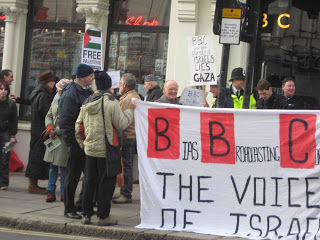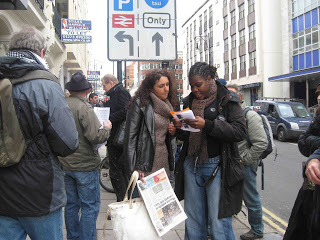What the BBC doesn’t admit to is a consistent and overwhelming pro-Israeli bias
 |
| BBC2’s Gavin Esler – a tame pro-Israeli broadcaster |
It’s always a good result to get anything out of the BBC, whose hostility to the Palestinians is palpable. At the time when the last Director-General, Greg Sykes, was sacked by virtue of the trumped up report from Lord Hutton, for not having done the government’s bidding more easily, a new era began. Ariel Sharon, Israel’s still comatose Prime Minister, threatened the BBC that it would lost its privileged access to Israeli news and the army, unless it changed its stance.
 |
| Brighton picket of the local BBC during the Gaza attack |
And Thompson, who was played by the last government like a puppet on a string, was willing to obey. He had seen the consequences of not so doing. So PSC’s determination to get the BBC to admit they are wrong is admirable.
 |
| BBC Broadcasting House |
Tony Greenstein
Submitted by Amena Saleem on Wed, 05/01/2013 – 18:11
The BBC has admitted that a report it broadcast in January implying that only part of the West Bank is under occupation was inaccurate.
The claim that there is a difference between “West Bank towns and villages and areas occupied by Israel” was made on the BBC’s heavyweight current affairs program, Newsnight.
Introducing an item about the Negev (Naqab) desert, presenter Gavin Esler, said: “Israeli soldiers shot dead a 17-year-old Palestinian youth today near the barrier which separates West Bank towns and villages from areas occupied by Israel.”
The Palestine Solidarity Campaign (PSC) wrote to the BBC to point out that the whole of the West Bank, including East Jerusalem, is under Israeli occupation and that a false distinction cannot be made between “West Bank towns and villages” and “areas occupied by Israel.”
The BBC initially wrote back defending Esler’s phrasing. In an email to the PSC, Stuart Webb of BBC Complaints wrote: “With this reference Gavin sought to broadly differentiate between parts of the West Bank administered directly by the Palestinian Authority and sections directly occupied by Israeli forces.”
At no point in his introduction to the Negev report had Esler mentioned the Palestinian Authority. Moreover, as the PSC pointed out in its reply, “West Bank towns and villages,” which Esler was implying are not under Israeli occupation, and “areas occupied by Israel” are one and the same — it is all Palestinian land which has been occupied by Israel since 1967. Put simply, the BBC was wrong to attempt to make any kind of differentiation.
“Belligerent occupation”
The facts make this abundantly clear. That the whole of the West Bank is under occupation is recognized by the UN, the UK and other governments, and by international organizations. The Israeli high court has ruled that Israel holds the West Bank under “belligerent occupation.” In July 2004, the International Court of Justice ruled that Israel illegally occupies the whole of the West Bank, with no distinction made between Area A and Area C — the zones under Palestinian Authority and Israeli administration respectively — in violation of international law. And, of course, UN Resolution 242 calls for the withdrawal of Israeli armed forces from territories occupied by Israel in 1967, including the whole of the West Bank.
It is curious then, with all of this information readily available, that the BBC made such a serious mistake in a scripted item, a mistake which downplayed the true scale of the Israeli occupation of Palestinian land.
Following further correspondence with the PSC, the BBC today acknowledged its mistake and apologized.
 |
| Passers-by stop to give the picketters encouragement |
The Newsnight team wrote in an email: “We agree that it was inaccurate to describe the barrier in this way with the implication that not all of the West Bank is occupied. The reference to the shooting in Budrus was intended to put a newsworthy top line in the introduction to a feature about the Negev desert and we apologize for the error.”
Newsnight added: “We regret any mistake we made,” but rejected claims of bias towards an Israeli narrative.
Catching them out
It was important to the PSC to pursue this case and secure an admission of error, because the narrative that it is only Area C that is under occupation is one that the BBC seems to be taking up across its reporting, and this needed to be challenged.
Most recently, on 17 April, in a documentary entitled Israel: Facing the Future, BBC presenter John Ware, filmed driving through Ramallah, said: “Although Israel occupies most of the West Bank, Palestinians are governed day-to-day by the Palestinian Authority, based here.”
Like Esler, Ware is not a rookie reporter. He knows, and his team of researchers would know, as Newsnight’s researchers should know, that Israel does not occupy most of the West Bank, it occupies all of it.
The reasons for the BBC trying to obscure this fact and mislead its audiences can only be guessed at. However, it is to be hoped that, now it has been challenged and caught out, its misreporting on this particular subject will cease across the whole of its considerable output.